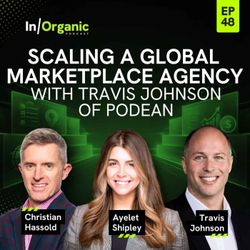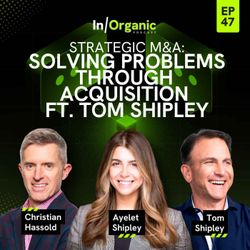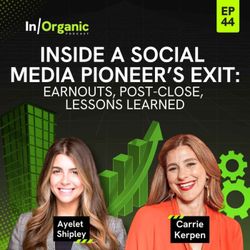Latest episode

E49: Silicon Valley's Next Target: Agencies, plus Details on the New Engen+Grapevine.ai Deal
20:59|In this episode, we explore the rising influence of AI in marketing agencies, the implications of tech-forward agency models, and recent high-profile acquisitions like Grapevine AI. Discover how private equity and Silicon Valley are reshaping agency valuations, deal structures, and the future of the industry.Key TopicsThe emergence of AI-native agencies as highlighted by Y Combinator's 2026 request listHow agencies are evolving to resemble software companies with higher margins and scalabilityThe challenges traditional agencies face integrating innovative, tech-led modelsTrends in agency valuations, deal structures, and the influence of private equityAn in-depth analysis of the recent Grapevine AI acquisition and its significanceThe shifting landscape of deal valuation, cash on close, and deal structure for tech-forward agenciesThe barriers to adopting AI and modern practices within conservative client organizationsThe strategic rationale behind merging creator economies with AI-enabled marketing solutionsTimestamps00:00 - Building custom Claude bots and the evolution of OpenClaw02:12 - Silicon Valley’s focus on AI-native agencies03:00 - How agencies will become more like software companies03:50 - The landscape of traditional vs. modern, tech-forward agencies07:02 - Private equity's view on services versus software investments09:40 - Recent acquisitions: New Engine’s Grapevine AI and other strategic moves11:32 - What makes Grapevine AI unique in creator-led content14:10 - The impact of deal structure and valuation rigor in AI agency acquisitions17:23 - How founders are pushing for tech-led valuations and lower risk models18:16 - The challenges of adapting legacy agency models to AI-driven futures20:11 - Industry response and what’s next for agency deal activityResources & LinksGrapevine AINew EngineY Combinator - 2026 Startups List (scroll to #3)LinkedIn - Caroline LaVereConnect with Christian and AyeletAyelet’s LinkedIn: https://www.linkedin.com/in/ayelet-shipley-b16330149/Christian's LinkedIn: https://www.linkedin.com/in/hassold/Web: https://www.inorganicpodcast.coIn/organic on YouTube: https://www.youtube.com/@InorganicPodcast/featured
More episodes
View all episodes

E48: Scaling a Global Marketplace Agency ft. Travis Johnson, co-founder, Podean
48:30|In this episode of the Inorganic Podcast, hosts Christian Hassold and Ayelet Shipley are joined by Travis Johnson, co-founder and Global CEO of Podean, to talk about the incredible story behind the one of the rising star Amazon and marketplace retail media agencies, which is now backed by Mountiangate. The conversation explores the origin of Podean, their successful search for private equity backers, their acquisition of Commerce Canal and their broader point of view on the opportunities in the retail media and marketplaces business. Travis shares insights on how Podean differentiates itself by offering integrated solutions that address not just media performance but also the broader operational needs of brands in the marketplace. He emphasizes the importance of understanding consumer behavior and the necessity for brands to adapt to the changing dynamics of e-commerce.TakeawaysPodean was founded to bridge gaps in the retail media landscape.Retail media is becoming increasingly important for brands.Global consistency is a priority for large brands.Podean's growth strategy includes a focus on social commerce.The partnership with Mountain Gate Capital aims to enhance Podean's capabilities.Navigating the M&A process requires careful preparation and cultural alignment.AI is seen as a transformative tool, but its implementation must be thoughtful.Future growth for Podean includes strategic acquisitions to enhance service offerings.Chapters02:28 Travis Johnson’s Background & Podean04:55 Retail Media Today & Holdco Limits08:00 Building a Global Marketplace Business10:41 Social Commerce & Live Shopping11:19 Winning Clients from Holdcos12:47 Early M&A Talks & Learning Private Equity16:00 Choosing the Platform Model & Mountaingate19:08 Control, Governance & Valuation Realities23:57 Strategic Buyers vs. Private Equity28:26 Commerce Canal: The Right Acquisition31:13 Closing Two Deals & Integration39:24 Using AI Without the Hype45:37 Growth Strategy & What’s NextConnect with Christian and AyeletAyelet’s LinkedIn: https://www.linkedin.com/in/ayelet-shipley-b16330149/Christian's LinkedIn: https://www.linkedin.com/in/hassold/Web: https://www.inorganicpodcast.coIn/organic on YouTube: https://www.youtube.com/@InorganicPodcast/featuredConnect with Travis Johnsonhttps://www.linkedin.com/in/travis-johnson77/ Follow Podean on LinkedInhttps://www.linkedin.com/company/podean/
E47: Solving Problems Through Acquisition ft. Tom Shipley
41:16|In this engaging episode, co-hosts Ayelet Shipley and Christian Hassold welcome Tom Shipley to share his journey of building and scaling businesses through acquisitions. He discusses the challenges and opportunities in mergers and acquisitions (M&A) present, emphasizing the importance of strategic thinking and relationship building. The conversation also explores partnership dynamics and the role of external partners in resolving conflicts. Tom highlights the power of acquisitions in overcoming business challenges and achieving growth, offering insights into the process of identifying and acquiring businesses.TakeawaysAcquisitions can solve almost every business challenge.Partnership dynamics often require external mediation.Strategic thinking is crucial in M&A.Building relationships is key to successful acquisitions.Acquisitions offer a faster path to business growth.Understanding seller motivation is essential in deals.Partnership conflicts can hinder business progress.Acquisitions can provide liquidity and strategic opportunities.Chapters00:46 Tom Shipley’s Path Into M&A01:38 The First Acquisition That Changed Everything05:34 Using Acquisitions to Solve Cash and Capability Gaps08:28 Buy vs. Build: Rethinking Entrepreneurship09:37 Seller Motivation and Why Deals Exist Everywhere11:50 Organic Growth vs. Acquisition Math13:41 Partnership Misalignment as a Growth Blocker14:21 How M&A Can Resolve Partner Deadlock19:26 Mergers as a Reset for Growth and Liquidity28:40 The Valley of Despair for Mid-Market Founders29:45 Buying the Next Chapter vs. Starting Over31:50 Where to Find Acquisition Opportunities37:49 Adding a Zero: Expanding the Mental Model39:44 DealCon, Reources, and CommunityConnect with Christian and AyeletAyelet’s LinkedIn: https://www.linkedin.com/in/ayelet-shipley-b16330149/Christian's LinkedIn: https://www.linkedin.com/in/hassold/Web: https://www.inorganicpodcast.coIn/organic on YouTube: https://www.youtube.com/@InorganicPodcast/featuredConnect with Tom Shipleyhttps://www.linkedin.com/in/t-shipley/
E46: The UK Independent Agency Scene w/Robin Skidmore, CEO Journey Further
50:53|In this episode of the Inorganic Podcast, co-host Christian Hassled interviews Robin Skidmore, a seasoned entrepreneur and the founder and CEO of Journey Further. They discuss Robin's journey from humble beginnings to founding successful agencies, including Epiphany Search and Journey Further. The conversation explores the evolution of Journey Further, its recent acquisition of Salderson Media, and the challenges of expanding into the U.S. market. Robin shares insights on agency culture, the current state of the UK agency market, and the importance of adapting to changes in consumer behavior and technology, particularly AI. The episode concludes with a discussion on Robin's investments in startups and the significance of maintaining a strong company culture as the agency grows.TakeawaysRobin Skidmore's entrepreneurial journey began with a car wash at age 12.Journey Further was launched in 2017 with a clear roadmap for growth.The agency focuses on performance media and aims to be creatively driven.Acquisition of Salderson Media was strategic for expanding capabilities.Expanding to the U.S. market presented unique challenges and cultural differences.Maintaining a strong company culture is crucial for agency success.The UK agency market is experiencing consolidation and increased competition.AI is transforming the marketing landscape, requiring agencies to adapt.Investing in startups allows for a deeper understanding of client challenges.Cultural dynamics influence agency operations and client relationships.Chapters00:00 Introduction to Robin Skidmore and Journey Further02:14 Robin's Entrepreneurial Journey and Epiphany Search04:52 The Evolution of Journey Further08:13 Acquisition of Salderson Media and Market Relevance10:32 Expanding to the U.S. Market: Challenges and Insights17:31 Cultural Differences in Agency Operations20:16 Lessons from Epiphany to Journey Further23:29 The State of the UK Agency Market26:21 Future Growth Strategies and Inorganic Expansion30:28 Cultural Dynamics in Agency Growth34:21 Investments Beyond Agencies: The Pub and Startups41:22 Maintaining Culture and Addressing AI ChallengesConnect with Christian and AyeletAyelet’s LinkedIn: https://www.linkedin.com/in/ayelet-shipley-b16330149/Christian's LinkedIn: https://www.linkedin.com/in/hassold/Web: https://www.inorganicpodcast.coIn/organic on YouTube: https://www.youtube.com/@InorganicPodcast/featured
E45: M&A Frenzy in the AI Era
31:28|In this episode, co-hosts Ayelet Shipley and Christian Hassold delve into AI related acquisitions, particularly focusing on outsized valuation multiples and whether they are sustainable or extensible to the digital agency sector. They discuss the valuation multiples seen in recent AI focused acquisitions led by Meta, Nvidia, Cvent, and OpenAI, and opine on the race for talent in the AI era. The conversation highlights the evolving landscape of agency capabilities in the face of AI advancements and the potential for consolidation in the market. The hosts also explore the future of digital agencies and the opportunities that lie ahead for strategic acquirers in the AI domain.TakeawaysAI is driving significant M&A activity in the tech sector.Recent acquisitions show high valuation multiples for AI companies.The trend of acquiring talent over products is prevalent in AI M&A.Digital agencies must adapt to the changing landscape influenced by AI.There is a potential consolidation in the agency market due to AI advancements.Strategic acquirers are looking for speed to market through AI capabilities.The valuation of AI startups is often based on capital raised rather than revenue.The market for AI capabilities in agencies is still developing.Founders may need to be realistic about their exit multiples in the current environment.The future of digital agencies will be shaped by AI innovations.Chapters00:00 Introduction to AI Trends01:03 M&A Activity in AI05:16 Valuation Multiples in AI Acquisitions11:00 The Talent Acquisition Race15:18 AI's Impact on Agencies19:07 Future of Digital Agencies25:01 Opportunities in AI AcquisitionsConnect with Christian and AyeletAyelet’s LinkedIn: https://www.linkedin.com/in/ayelet-shipley-b16330149/Christian's LinkedIn: https://www.linkedin.com/in/hassold/Web: https://www.inorganicpodcast.coIn/organic on YouTube: https://www.youtube.com/@InorganicPodcast/featured
E44: Inside a Social Media Agency Pioneers Exit: Earnouts, Post Close, Lessons Learned
28:46|In this episode of the Inorganic Podcast, co-host Ayelet Shipley interviews Carrie Kerpen, a pioneer in social media and co-founder of Likeable Media. They discuss Carrie's journey from starting a social media agency to successfully exiting the business. Carrie shares insights on the importance of profitability, setting exit goals, choosing the right M&A advisor, and negotiating earn-outs. She reflects on her experiences and the lessons learned, particularly for women entrepreneurs, and emphasizes the need for community and support in the business world.TakeawaysCarrie started Likeable Media in 2007, one of the first social media agencies.The initial focus was not on exiting but on building a profitable business.Setting a target exit value can help guide business decisions.Timing and personal readiness are crucial when deciding to sell a business.Choosing the right M&A advisor can significantly impact the sale process.Negotiating earn-outs requires careful consideration of control and reporting.Reflecting on the exit process can reveal areas for improvement.Building a community for women founders can provide essential support.Women entrepreneurs often face unique challenges in the exit process.M&A can be a powerful tool for business growth and problem-solving.Chapters0:00 Introducing Carrie Kerpen1:05 Founding Likeable Media 3:33 Early Growth & Cash Flow Challenges5:22 Becoming CEO and Focusing on Profitability6:37 Market Shifts & Productizing the Agency7:21 Building a Brand through All the Social Ladies9:07 Financial Stability & the $20M Exit Goal 10:43 Knowing When It's Time to Sell12:55 Choosing an M&A Advisor vs. a Banker15:36 Price vs. Timing After the Exit18:22 Negotiating & Protecting an Earnout22:02 Life After the Sale23:12 What Carrie Would Do Differently24:51 Acting Like a Platform and Rethinking Capital25:58 The Exit Gap and The Whisper Group27:45 Closing ThoughtsConnect with Christian and AyeletAyelet’s LinkedIn: https://www.linkedin.com/in/ayelet-shipley-b16330149/Christian's LinkedIn: https://www.linkedin.com/in/hassold/Web: https://www.inorganicpodcast.coIn/organic on YouTube: https://www.youtube.com/@InorganicPodcast/featuredConnect with guest, Carrie Kerpenhttps://www.linkedin.com/in/carriekerpen/
E43: State of Holdcos and What it Means for Independents w/Chloe Cotoulas of Everos
37:43|SummaryIn this episode of the Inorganic Podcast, co-hosts Christian Hassold and Ayelet Shipley chat with Chloe Cotoulas, Partner at Everos Group and an investment banker with a diverse background in advertising and finance. On this episode they discuss Chloe's unique career path, the evolution of holdcos in the advertising industry, and the impact of market trends on large-scale independent agencies. The conversation also explores the future outlook for deal activity in the coming quarters, emphasizing the importance of AI and experiential marketing in shaping the industry.TakeawaysChloe transitioned from a creative background to investment banking.The convergence of creativity and business is crucial in today's market.Holdcos are facing challenges due to changing market dynamics.AI is reshaping the advertising landscape and agency operations.Experiential marketing is becoming central to brand strategies.The enterprise value of agencies is often misrepresented in the market.Private equity is increasingly interested in the advertising ecosystem.Founders are reconsidering their exit strategies in light of market changes.The importance of financial performance in upcoming deal activity is paramount.Prompt engineering is emerging as a valuable skill in the creative industry.Chapters00:52 Chloe Cotoulas' Presidential Writing Experience05:07 Chloe’s Career Path from Creative to Finance10:04 Holdco Shakeups, IPG–Omnicom, & WPP17:26 How Market Turmoil Impacts Independents19:03 New Buyers & Founder Mindset 22:38 Selling to Holdcos vs. Challenger Networks24:15 The Rising Trend of Experiential + Social30:19 Deal Flow Outlook for the Next Two Quarters32:45 AI Opportunity: Differentiation & Acceleration33:24 AI Risks, Defensibility, & Prompt Engineering36:51 Closing Thoughts Connect with Christian and AyeletAyelet’s LinkedIn: https://www.linkedin.com/in/ayelet-shipley-b16330149/Christian's LinkedIn: https://www.linkedin.com/in/hassold/Web: https://www.inorganicpodcast.coIn/organic on YouTube: https://www.youtube.com/@InorganicPodcast/featuredConnect with guest, Chloe Cotoulashttps://www.linkedin.com/in/chloe-cotoulas-92082861/
